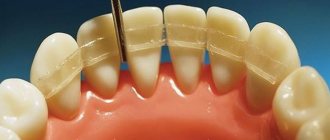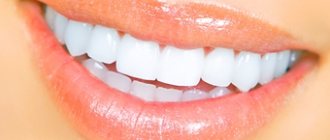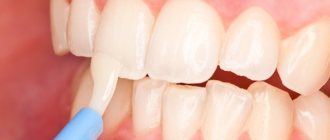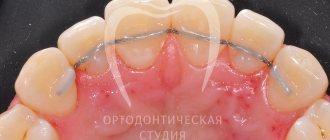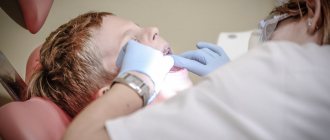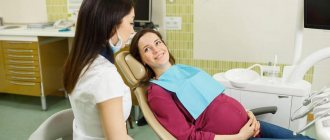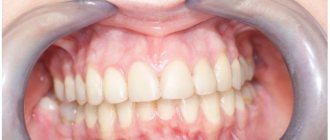What are the causes of the numerous problems with teeth and gums that expectant mothers suffer from? How can they maintain a healthy smile, and can they be treated by a dentist during pregnancy? We answer the most important questions about pregnancy and teeth.
Dentists at appointments often hear the same story from patients: “Doctor, my teeth started to fall out during (after) pregnancy.” Many women have the feeling that during intrauterine development the child “takes” calcium from the mother’s teeth, causing caries and gum disease.
In fact, this is a myth that has no scientific evidence. The calcium reserves necessary for the baby's development are not replenished by the mother's teeth. Why then do dental problems worsen during pregnancy?
What happens to teeth and gums during pregnancy?
Most often during this period, women complain of an exacerbation of diseases such as caries, gingivitis, and periodontitis. Each of them can lead to tooth loss if not treated promptly.
Toxicosis can also become a catalyst for carious processes. Nausea and vomiting, as well as changes in eating habits (large amounts of carbohydrates) cause disruption of the acid-base balance in the oral cavity, demineralization of teeth and the development of caries. If you do not sanitize the oral cavity before pregnancy, even minor carious lesions can turn into large lesions within nine months.
During pregnancy, hormonal levels (estrogen and progesterone levels) change and immunity decreases, which can lead to disruption of the gums' response to plaque formation. By leaving ordinary plaque unattended and untreated, you risk causing it to degenerate into tartar, which can damage the entire tooth.
Plaque also causes the development of gingivitis, an infection of the oral mucosa that causes swelling, redness, and bleeding of the gums. Due to altered hormonal levels, any inflammatory reaction in the body of the expectant mother is more violent, which is why the disease is otherwise called “hypertrophic gingivitis” or “gingivitis of pregnant women.” If it is not cured, it can develop into periodontitis, which means that gradual resorption or loss of bone tissue, suppuration of gum pockets and tooth mobility will be added to the listed symptoms.
However, it is still not worth linking a sharp deterioration in oral health with pregnancy. If you maintained proper oral hygiene before pregnancy, regularly attended preventive examinations and had professional cleanings every six months, then all of the problems listed above will most likely not affect you.
It’s another matter if you have never removed dental plaque and have not treated caries. Even if they practically didn’t bother you before pregnancy, during pregnancy the previously “acquired” problems will most likely worsen.
Safety first
Perhaps you have been putting off visiting the dentist for a long time, and now a tooth that was not filled in time is beginning to make itself felt, but you are more concerned about how anesthesia may affect the development of the fetus. There is no need to worry: according to researchers, dental treatment using local anesthesia with modern safe drugs can also be performed on pregnant women. Unfortunately, too many expectant mothers avoid dental treatment because of a perceived threat. Don't join their ranks.
During pregnancy, the risk of tooth decay increases, and there are several reasons for this. Women begin to consume more carbohydrates; due to toxicosis, the acidity of the oral environment increases; against the background of hormonal changes, gum bleeding increases. It is paradoxical that pregnant women are in no hurry to consult a dentist with these problems, when it is his help that they so need.
Can a mother’s “dental” diseases affect the baby’s health?
Sick teeth and inflamed gums are a source of infection for the entire body. From the carious cavity, microbes can penetrate through the root canal into the blood and even provoke disturbances in the functioning of internal organs (heart, kidneys, etc.).
In addition, recent studies suggest that premature birth and the birth of low-weight children may be associated, among other things, with gum disease - an infection in the mother’s body can adversely affect the child’s health. Therefore, preventive dental examinations are extremely important for the health of both the child and the mother.
Professional oral hygiene during pregnancy
The question is also often asked: “is it necessary to do professional hygiene during pregnancy?” My answer is definitely, this needs to be done. Now there is such a term - gingivitis of pregnant women. Since metabolism changes during pregnancy, quite a lot of female sex hormones are produced, under their influence all mucous membranes, including the gums, change. The gums become steeper and looser. They become more permeable to bacteria. Accordingly, bacteria, which are always present in the oral cavity, very easily penetrate the gum tissue and cause inflammation. This develops in about 70% of cases. Therefore, professional hygiene is recommended. It is advisable to do this as planned in the second trimester. As a rule, almost all pregnant girls require it.
Another important question is whether it is possible to remove teeth during pregnancy? It all depends on certain indications. If this is a planned tooth extraction, that is, for example, the removal of wisdom teeth, then I would recommend postponing this manipulation until the postpartum period if it does not cause discomfort. In the presence of an acute inflammatory process, tooth extraction in any trimester of pregnancy is clearly indicated.
Online consultation with a dentist
consultation cost: 500 rubles
Online consultation
During the consultation, you will be able to voice your problem, the doctor will clarify the situation, answer your questions and give the necessary recommendations.
First trimester
Now I would like to talk about dental treatment in different trimesters of pregnancy. Let's look at the first trimester first. It lasts inclusively until the twelfth week. During this period, active division of fetal cells occurs, and the formation of all major organs and systems occurs. The placenta is currently not yet formed, it cannot protect the unborn baby, which is why no planned dental interventions are recommended during this trimester, because this may pose a certain threat to the health of the unborn baby. But of course, the exception here is the provision of emergency dental care in case of severe pain and any inflammatory diseases of the oral cavity.
Second trimester
The second trimester lasts from the thirteenth week to the twenty-fifth week inclusive. This is the most favorable period for dental treatment of the oral cavity. Accordingly, all the organs of the system of the unborn child are already formed, the placenta is functioning, it is already able to protect the baby from various foreign substances, including medications that enter the mother’s body. Therefore, accordingly, the use of anesthesia in the expectant mother is safer and dental treatment is more successful.
Third trimester
The third trimester begins from the twenty-sixth week. This is a less favorable period for dental treatment, because, as a rule, the child is already quite large, it is difficult for the expectant mother to endure various dental procedures, plus there is a risk of premature birth, but, nevertheless, treatment is possible. And I would like to summarize, again, if emergency dental care is required, it is carried out at any stage of pregnancy, because the disease can pose a threat to the unborn baby.
From my personal practice, I can cite a case where an expectant mother developed pulpitis in the third trimester of pregnancy, that is, it was a fairly pronounced pain syndrome, the tooth hurt very much, it had to be depulped, the nerve removed and temporarily filled with a medicinal substance and a filling put in. Since X-rays were not shown in this case, further treatment of this tooth took place in the postpartum period, when it was already possible to take X-rays and also permanent root canal filling.
When to visit the dentist and what procedures are allowed?
The best option is to solve all dental problems and have professional cleaning done in advance, before planning a pregnancy, in order to minimize possible risks. But if you have started the situation, and dental treatment during pregnancy cannot be avoided, then you should remember the precautions.
Thus, in the first and third trimesters, you should limit yourself to only urgently necessary procedures, be sure to consult with your gynecologist about anesthesia or taking medications. Based on these recommendations, your dentist should determine the need for hygienic teeth cleaning and therapeutic treatment in the first trimester.
The safest time for dental treatment is the second trimester (14 to 26 weeks). At this stage, all manipulations can be carried out - taking precautions, of course. However, if possible, it is better to avoid introducing pharmaceutical drugs into a woman's body.
During pregnancy, it is highly recommended not to undergo procedures such as implantation and prosthetics, resort to surgical treatment, or remove tartar. This is due to the use of anesthesia.
Women are allowed to treat caries during pregnancy and periodontal diseases, inflammatory processes in the gums and teeth, tooth extraction (non-surgical), and installation of braces (if there is no tooth mobility).
Is it possible for pregnant women to have their teeth cleaned in Moscow?
On specialized forums for expectant mothers, debates regarding the possibility of dental treatment continue. Meanwhile, the best specialists in the capital urge you not to discuss problematic issues with your friends, but to seek advice from experienced dentists who have all the necessary knowledge and skills. When prescribing any dental procedures, the following are always taken into account:
- the degree of their need;
- gestational age;
- general health of the patient.
Accordingly, if the dentist sees the need to remove tartar and soft deposits, he will act in tandem with the gynecologist. Contraindications may include both pregnancy pathologies and acute or existing chronic diseases of the patient.
Is it possible to have x-rays and anesthesia during pregnancy?
Many experts, including those from the American Dental Association, note that if you can avoid X-rays during pregnancy, then it is better to play it safe and refuse this type of diagnosis. The same applies to anesthesia.
However, if x-rays and anesthesia are still necessary, you should resort to them in the second trimester, because in the first trimester, the formation of the baby’s vital organs occurs, and in the third, it is already physically difficult for a woman to perform any procedures. When choosing an anesthetic drug, your dentist should choose anesthetics with minimal amounts of epinephrine.
As for x-rays, the type of examination officially approved for pregnant women and nursing mothers is diagnostics using a dental computed tomograph. The radiation exposure in this case is minimal. In addition, the device gives the doctor the opportunity to accurately identify problems at the earliest stages of diseases, which helps to avoid diagnostic errors and complications.
Advertising
Secretly around the world
Announcing your pregnancy can be difficult and is certainly a sensitive topic. However, you should not have secrets from doctors. This rule also applies to the dentist. Although many couples choose to wait until the second trimester of pregnancy to share the good news with family and friends, you should tell your dentist that you are expecting a baby right away at the beginning of your appointment. In addition, you need to tell him what medications or vitamins you are taking. If necessary, your dentist and therapist will coordinate their appointments.
How to care for your teeth during pregnancy?
- Limit your consumption of carbohydrates and sweets - they provoke tooth decay.
- Replace sodas with water or low-fat milk and fruit juices with fruit.
- Brush your teeth with fluoride toothpaste and floss twice a day. Special pastes with sage, chamomile, and mint, which have an anti-inflammatory effect, are also effective.
- For frequent attacks of nausea and vomiting, chewing gum without sugar or with xylitol will help you, as well as rinsing your mouth with a soda solution after an attack (1 teaspoon of soda per glass of water). This will neutralize the negative effects of acids on enamel.
So, so that diseases of the teeth and gums do not overshadow the most important period in a woman’s life, you should prepare for it in advance - go to the dentist, get rid of caries and inflammatory gum diseases, and also regularly undergo professional hygienic cleaning.
Why might an expectant mother refuse to cleanse?
In addition to medical contraindications, there may be a number of personal reasons why it is recommended to avoid in-office teeth cleaning during pregnancy.
The first factor is purely psychological, but it is also the most important. If a woman is nervous when visiting a dental clinic, then there is no need to carry out cleaning unless indicated (only according to indications). It is impossible to worry the expectant mother, much less make her very nervous and experience discomfort. There are cases when you cannot do without the help of a doctor - with gingivitis, which pregnant women often suffer from, acute pain, caries, etc. Professional cleaning can usually be delayed for several months.
The second important factor is also largely related to the psychological state. If teeth are highly sensitive, even men and women who are not expecting a child are often advised to avoid ultrasonic cleaning. It can make teeth even more sensitive, which will lead to additional stress for the expectant mother.
Nutrition and vitamin intake to maintain dental health
The need for vitamins during pregnancy increases by approximately 1.5–2 times, which is due to the intensification of metabolic processes in the mother’s body and the use of some vitamins to meet the metabolic needs of the growing fetus. Mineral metabolism also changes: calcium and phosphorus in the pregnant woman’s body begins to pass to the fetus. As a result, a woman’s blood becomes deficient in them, which affects the condition of the hard tissues of the tooth [2].
Vitamin preparations can cause unwanted effects, and some of them have a potential teratogenic effect, so they should be selected together with a doctor [3]. For prevention, vitamins are used in doses close to the daily intake norms [1, 3].
It is important to reconsider the content of the diet - limit the consumption of sweet foods, giving preference to healthy foods rich in proteins, vitamins and minerals. It is worth increasing the amount of dairy products - sources of calcium, as well as eating more fresh vegetables and fruits [3].
Healthy teeth for the father and mother are the key to healthy teeth for the child
Already in the fifth or sixth week of pregnancy, the rudiments of the baby’s teeth are formed. If the mother has a “bad” mouth by this period of pregnancy, then the process of mineralization of the fetal tooth buds is disrupted, which over time will lead to problems for the child, both with milk and permanent teeth.
For normal growth of bones and tissues of the unborn child, in addition to other minerals, sufficient amounts of calcium and fluoride are necessary. A well-balanced diet rich in vitamins A, C, D, minerals, plus nutritional supplements or prenatal vitamins will fully compensate the body and promote good overall health and normal dental development for the baby. Nutritional supplements and vitamin-calcium complexes are individually selected by a gynecologist.
Foods richest in calcium: milk and dairy products, kale, broccoli, spinach, baby turnips. Calcium is best absorbed from fish products.
A lack of calcium may be indicated by seizures and tooth decay in the mother. If symptoms appear, you should consult a doctor. You should not take calcium supplements on your own, as an excess of it will lead to skeletal disorders in the fetus.
However, the quality of the baby’s teeth depends not only on the condition of the mother’s teeth. Half of all dental problems in babies are caused by their father. No matter how much a pregnant woman takes care of her mouth, when communicating with her husband, kissing him, she transfers “harmful” microflora into her oral cavity. The husband should have all his teeth treated after, or better yet before, he finds out about his wife’s pregnancy.
There probably won’t be a parent who hasn’t hugged and kissed their barely born child. Every kiss is a swarm of microorganisms, and not always harmless ones.
Be it a father, grandfather or grandmother, everyone considers it their duty to cuddle and breathe on the baby. Before allowing all relatives near the baby, a prudent mother should first send her household members to the dentist's line.


